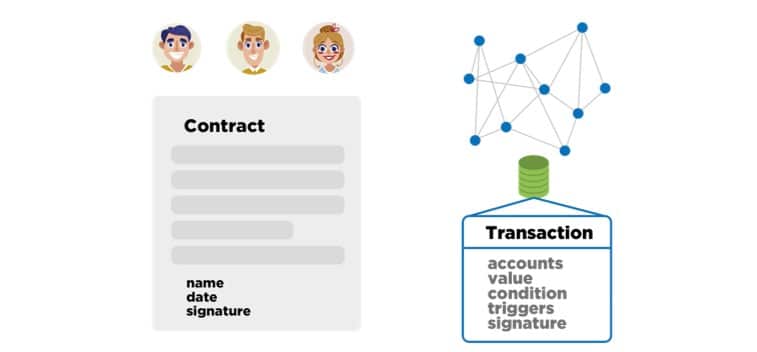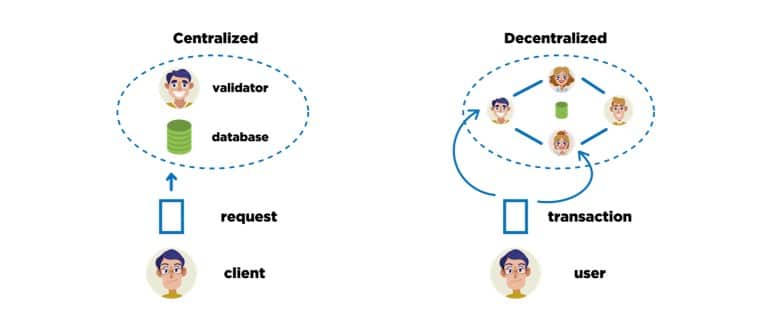Introduction to Smart Contracts: Do They Need to be Legally Binding?

The government of Tennessee now officially recognizes Smart Contracts. This is a great news if we speak of the broad publicity component. By virtue of such events, the blockchain technology and all that’s related to it are drawing closer to become a standard approach and the way of how things work. However, the practice shows that the deeper you delve into the aspects, the more you understand that we are at the very beginning of quite a long and so far uncertain path. Before we investigate Smart Contracts on the back of a Tennessee law, it is better to explain the concept in the easiest possible way.
Traditional Contract versus Smart Contract

A traditional contract is simply a notarized piece of paper that details actions that are to be performed under certain conditions. Let’s assume there’s a group of individuals who would like to establish rules of how and under which conditions certain values are to be allocated. They need guarantees. That’s why they will constitute a contract. This paper doesn’t control the actions fulfillment, but only assures it. In case something is done against the contract terms, there’s court — the trusted face of justice, that will work things out if you show enough evidence of lawless actions.
Smart Contract. Just like a paper contract, it specifies the conditions. Along with that, since a smart contract is basically a program code, it carries out actions (which is impossible when we deal with the paper one).

Most typically, smart contracts are executed in a decentralized environment, where:
- Anyone can become a validator and verify the authenticity of correct smart contract execution and the state of the database. Distributed and independent validators supremely minimize the third-party reliance and give confidence concerning unchangeability of what is to be done. That’s why, before putting a smart contract into action you should very accurately check it for bugs. Because you won’t be able to do something once it’s launched.
- All assets should be digitized. And all the data that may serve as a trigger for Smart Contract execution must be located within one database (system).
What are Oracles?
There’s a popular myth that smart contracts in Ethereum can take exterior data from the web and use it in their environment (for example, smart contract transfers money to someone who won the bet, considering the football match results) You can not do that, because smart contract only relies on the data that’s on Ethereum blockchain. Still, there is a workaround. The database (Ethereum’s, in our case) can contain so-called oracles — ‘trusted’ parties that collect the data from ‘exterior world’ and deliver it to smart contracts with the aid of certain methods. For more precision, it is necessary to choose a wide range of independent oracles that provide a smart contract with information, in this way, minimize the risk of their collusion.
Smart Contract Itself is Only a Piece of Code
For a better understanding, take a look at what Pavel Kravchenko, CEO of Distributed Lab, wrote about Smart Contracts on his Medium: “A smart contract itself is a piece of code. The result of this code should be the agreement of all participants of the system regarding account balances (mutual settlements). From here indirectly it follows that a smart contract can only manage money that has already been digitized. Without a payment system that provides such opportunity (for example, Bitcoin, Ethereum or central bank currency), smart contracts are absolutely helpless!”
Smart Contracts under the Tennessee law
And so. Store data on a blockchain is now a legit thing to do in Tennessee. Here are some of the primary conditions stipulated by the law:
- Records or contracts secured through the blockchain are acknowledged as electronic records.
- Ownership rights of certain information stored on blockchain must be protected
- The Smart Contract is considered as an event-driven computer program, that executes on an electronic, distributed, decentralized, shared, and replicated ledger that is used to automate transactions.
- Electronic signatures and contracts secured through the blockchain technologies now have equal legal standing with traditional types of contracts and signatures.
It is worth noting that definition of a smart contract is pretty clear and comprehensive here. But, unfortunately, it doesn’t let the matter rest, and some questions were not covered:
- How can smart contracts and the traditional ones have equal legal standings if the functionality of a smart contract is much broader? Namely, it performs actions, while traditional contract only assures them.
- How will asset digitization be carried out?
- Do they provide any requirements for the Smart Contract source code or some normative audit that is to be performed in order to minimize bugs risk?
- Will they develop their own Smart Contract platform or assume the usage of the existing ones (Ethereum, Bitshares, etc.)?
The Problem is not with Smart Contracts, but with Creating the Groundwork for their Successful Appliance
Unfortunately, it is impossible to build uniform smart-contract-based relationships only at the expense of the fact that regulator officially recognized the technology. For example, you won’t be able to sell your apartment via Smart Contract functionality if there won’t be a regulative base that considers:
- The specified blockchain platform on which smart contract functionality is good enough to sustain a broad use
- The way assets are digitized. And it’s not only about digital money that you will be using to conduct transactions. But any valuable information like, for example, ownership rights. So that you could prove that you own some flat, only because this fact is seen on the blockchain.
- Who can be the authorized party/oracle that collects the exterior data and delivers it to the Smart Contract (Speaking of apartments, it is basically the notary, who should verify such parameters as; ownership of the apartment, its state, even your existence, etc.)
So, it’s true. Smart Contract itself is a piece of code and objectively is not a problem at all. What is a problem, however, is to prepare a sound basis for the successful implementation of Smart Contracts in our everyday life. Create and launch a mechanism that would allow the connection of two entirely different gear wheels:
- smart contracts in its digital, decentralized and trustless environment
- the real world, where we mostly deal with the top-down approach and have regulators, lawyers, courts, etc.
That’s how we concluded that governments simply couldn’t adapt smart contracts according to the existing laws and traditional state of things. Just because it won’t be a smart contract anymore. So, there’s no problem if blockchain-related technologies will be legally binding, but it shouldn’t contradict the main concept of decentralization.













